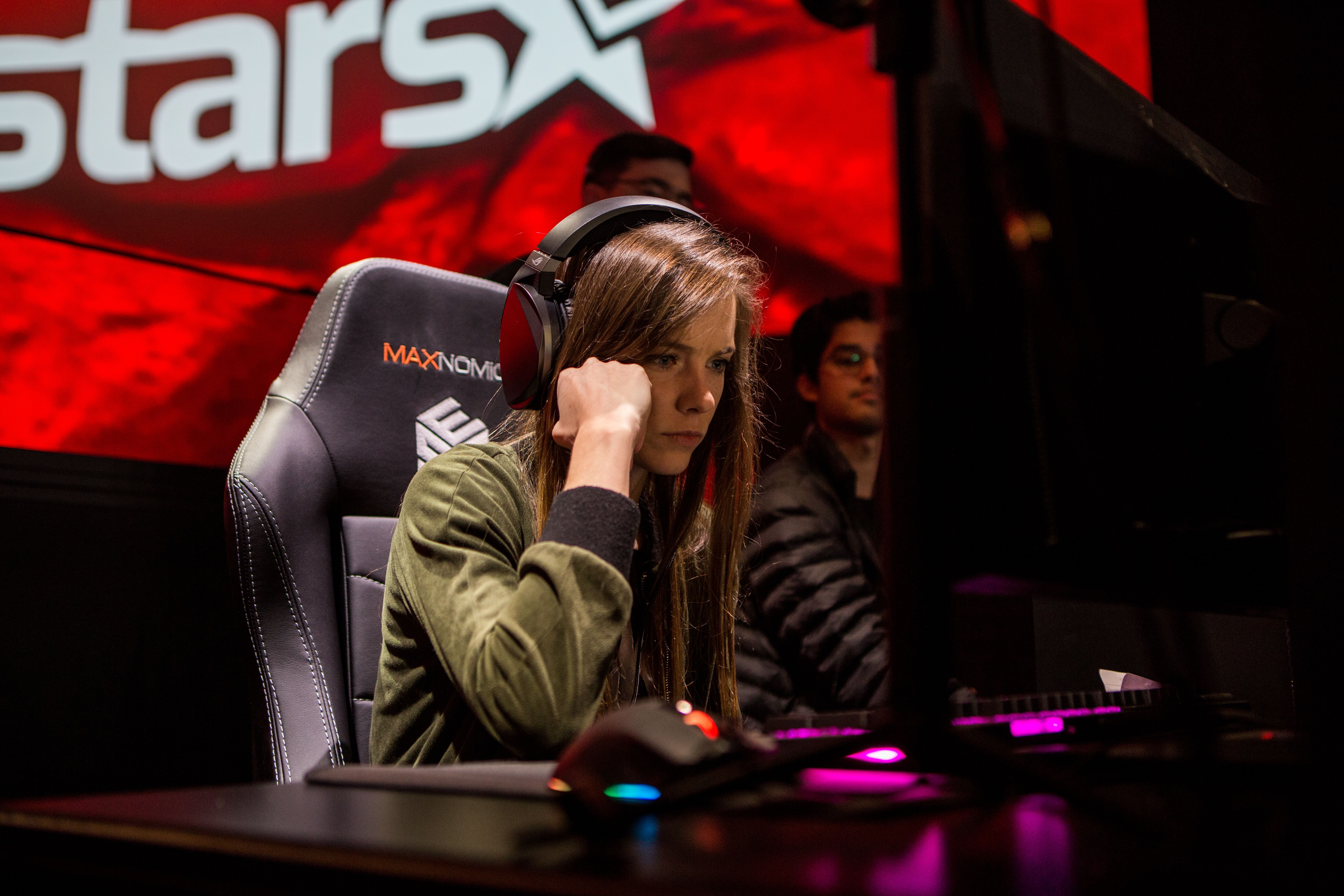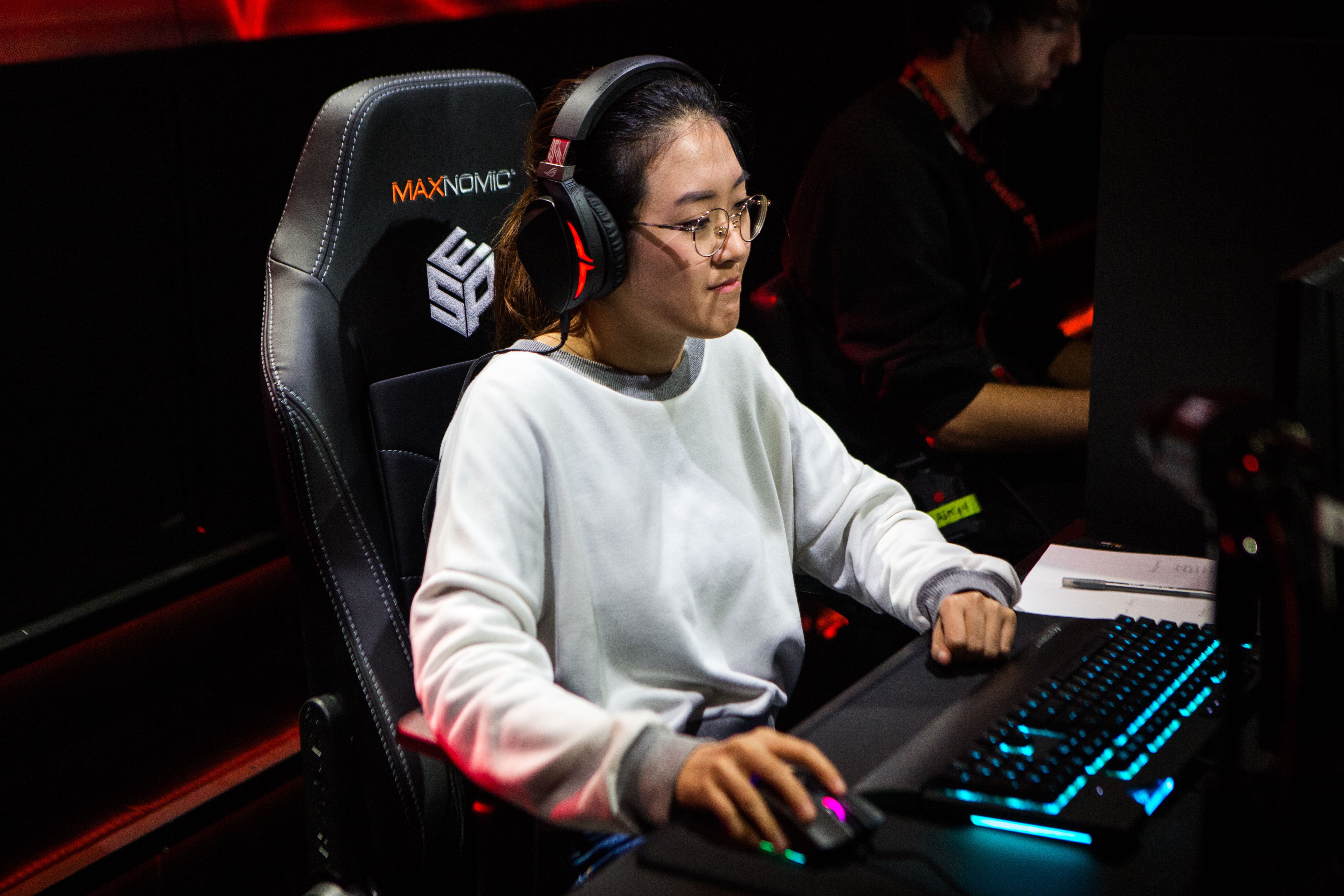Blizzard pledges to do better after wave of criticism from female Hearthstone pros
Women in the competitive scene told the company it had failed to tackle toxicity and representation issues.

In November 2019, Xiaomeng "VKLiooon" Li hoisted the Hearthstone World Championship trophy in front of her peers at BlizzCon. As confetti rained down, it felt like we were witnessing a turning point. "A new chapter has begun in Hearthstone history," announced Dan "Frodan'' Chou as he joined Li on stage for the coronation. Li was, and still is, the only woman to win a World Title in Hearthstone. Alkali Layke, a Hearthstone Twitch streamer and cosplayer, remembers it like it was yesterday. She was in the crowd, taking it all in.
"I never had so many chills. I was so proud. We thought, in that moment, that things were going to change," says Layke, in an interview with PC Gamer. "It didn't. We haven't seen a single change since VKLiooon won."
The realization that it wasn't just faceless trolls and assholes really hurt.
Cora Georgiou
Over the past week, the Hearthstone community has been embroiled in controversy over the way the game fails to address the lack of women in its scene. The flashpoint this time was a Blizzard-run competition called the Crossroads Inn-vitational, which took place on Wednesday, and pitted two teams of Hearthstone personalities against each other in pursuit of a $100,000 prize pool. The initial roster featured 18 men and only two women, which made some content creators, like Slysssa, wonder aloud why so many female content creators are overlooked for those spots. (Slysssa also mentioned that Blizzard asked her to run an all-women Battlegrounds tournament last year. She says she petitioned Blizzard to make the competitor's pool more diverse, but was told no by the company as it "would look bad" if the women lost.)
Prompted by that conversation, more and more women around the scene—including full-time Hearthstone developer Cora Georgiou, who had previously been a competitor and caster, and former Grandmaster Pathra Cadness—started sharing their own personal experiences navigating the games industry. Many of them spoke about absorbing the chronic toxicity of Twitch chat, or contending with both the quiet biases of their peers, and in Pathra's case, outright bullying by another streamer and his fans.
Blizzard eventually responded and added two more women to the lineup, with previous invitees Kripparrian and RegisKillbin offering to give up their spots. However, if you know Hearthstone—hell, if you know esports—you understand that this divide runs deeper than one botched tournament, and will take more than a couple of extra invites to improve.
I feel you. I was asked recently why I stopped playing HS and I found it hard for me to currently play a game for fun that I have had bad experiences/memories tied with that I can’t really forget. When I stopped I felt happy, free, no judgement and its why I speak out more lately https://t.co/KxBgM333LiApril 18, 2021
After all, only three months ago Hearthstone grandmaster Zalae was accused by an ex-partner of emotional and physical abuse, which was left unacknowledged by the company until April 8 (Zalae has since been suspended.) Or perhaps you recall Eloise, and her unique way of evoking a sputtering rage in the most dedicated of Hearthstone stream-watchers, or that odd, sweaty period where the game's major personalities would swipe through Tinder live and uncut for a leering audience. Tangentially, but not unrelated when discussing representation and the behavior of the community, who can forget what happened to Terrence "TerrenceM" Miller—one of Hearthstone's few Black competitors—who was subject to some truly disgusting comments while playing in tournaments during 2016?
All of these factors, from the small indiscretions to the massive embarrassments, have served to create an environment in which the people on-screen at the average Hearthstone event are often cis men. It is why there's currently only one woman in Grandmasters, and why so many in the community were upset when the initial Inn-Vitational roster was unveiled. One recurrent theme in my interviews is how often those unwelcoming vibes can manifest in subtle, almost subliminal ways.
Keep up to date with the most important stories and the best deals, as picked by the PC Gamer team.

It's easy for a lot of men to process the most disgraceful behavior that happens in Twitch chat and reassure themselves that they'd never type stuff like those troglodytes. But when I asked Jia Dee, the caster who handles Hearthstone's Asia and Pacific Grandmasters bracket, to expand upon her experiences, she pointed to something that I think a lot of men are likely guilty of.
"At an afterparty of a LAN a few years ago, I was talking to someone with quite a bit of pull in the scene. At the time, there were only two active female English-speaking casters for premiere Hearthstone events, of which I was one. This person told me, 'I think your casting is better than hers,' presumably just trying to compliment me," says Dee. "I asked why he thought to compare specifically us two women, when there were a handful of other men at a similar experience level to me in Hearthstone casting that he could have easily used as a point of reference. He thought about it, owned up, and apologized. He is absolutely not a bigoted person, by the way; it just goes to show how some things can be subconsciously harmful too. I hope everyone can be better about checking themselves, and each other—but still approach those you disagree with in good faith." (Jia expands on these thoughts in a Twitter thread here.)
4/ That toxicity is a small part of a much broader sexism present in most societies, but I’ll only focus on how it manifests in gaming spaces. This is how I see the negative feedback cycle in my head. (Prob even more negative effects I didn’t cover, sorry) pic.twitter.com/3SS1hPywbpApril 17, 2021
And then there's the unsubtle problem: those aforementioned troglodytes in Twitch chat and on social media. Perhaps the most harrowing stories shared this past weekend belonged to Cora Georgiou, who wrote about how after years spent in front of a camera absorbing countless mean comments about her appearance, she felt a need to find a position behind the scenes for her own wellbeing. "I wasn't strong enough to stick around in a high visibility role anymore," she wrote. "And I feel guilty that I threw in the flag when so many women in the community looked up to me."
Georgiou also notes that she was sent screenshots from a private Discord channel where several high-profile Hearthstone community members had said "awful" things about her. "The realization that it wasn't just faceless trolls and assholes really hurt," she wrote.
Pathra, who played in the initial rollout of Hearthstone Grandmasters, also decided to step away from the scene for similar reasons. In a short essay posted to Twitter, she wrote how being one of the few women thrown into a highly competitive environment made her feel like a "guinea pig in a social experiment"—noting how much vitriol was thrown her way during the Grandmasters broadcast by the chatbox due to a perception that she didn't belong with the boys.
"I offered some of my [Twitch] mods who were willing to be there to help, but [Blizzard] had their own team. There was just either not enough of them, or someone was slacking, or it just wasn’t a priority back then," says Pathra, in an interview with PC Gamer. "After some time they began noticing they needed to do something about it but it was already damaging at that point towards me."
It remains one of the longstanding deficiencies in esports. Blizzard has few women involved in the Hearthstone competitive community, and the ones that are there often feel like they're under the microscope. Surely, there must be a way to create an equitable environment where women won't feel tokenized or shortchanged?
Why I don't play Hearthstone anymoreRead: https://t.co/eQNAnUnRd0April 20, 2021
If Hearthstone is one of the most popular mobile games, why aren't you marketing to women?
Layke
Pathra believes that Blizzard could start by increasing the ratio of women at events like the Inn-Vitational to "at least 20 to 25 percent." That, she argues, would reduce the feelings of alienation under the spotlight. Given that events like these are organized entirely on a discretionary basis, the company is well within its power to diversify the playing field. Blizzard issued this statement when reached for comment: “We are committed to supporting and celebrating diversity and inclusion in our community. Every Hearthstone community event will have a greater representation of women moving forward and we’re working on additional plans which we believe will contribute to a more diverse and inclusive community overall.”
Layke, the streamer who was at VKLiooon's championship match, says that Blizzard doesn't do nearly enough to market Hearthstone to women. More than half of the world's mobile gamers are women, and Hearthstone remains Blizzard's premiere mobile experience. There's a disconnect there, argues Layke. Hearthstone could easily be finding more women where they prefer to play.
"You have a female who just won [the World Title], why wouldn't that be on all of your mobile apps?" she says. "If Hearthstone is one of the most popular mobile games, why aren't you marketing to women?"
More generally, how much of an effort is Blizzard going to make here? Does it believe that there is a real pathway to subvert the status quo? Or is it content with small reforms that leave everyone—particularly the women involved—disappointed? That's what everyone's asking, and it's not just Blizzard facing these questions: Every company in esports should be looking for answers.

Luke Winkie is a freelance journalist and contributor to many publications, including PC Gamer, The New York Times, Gawker, Slate, and Mel Magazine. In between bouts of writing about Hearthstone, World of Warcraft and Twitch culture here on PC Gamer, Luke also publishes the newsletter On Posting. As a self-described "chronic poster," Luke has "spent hours deep-scrolling through surreptitious Likes tabs to uncover the root of intra-publication beef and broken down quote-tweet animosity like it’s Super Bowl tape." When he graduated from journalism school, he had no idea how bad it was going to get.

